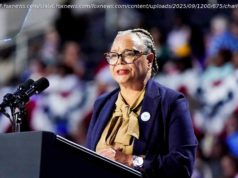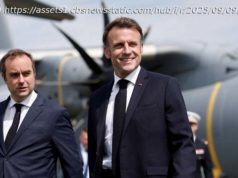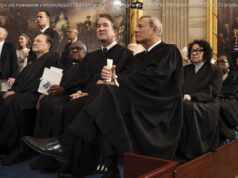Kim Jong Un appears to be maneuvering toward a big “get” – the chance to sit down with Trump on an equal basis as the head of a nuclear-armed nation.
TOKYO – North Korean leader Kim Jong Un has finally broken his silence on what he plans to bring to the table during his summits with the South Korean and U. S. presidents, and it doesn’t have a whole lot to do with tossing out his hard-won nuclear arsenal.
Instead, Kim appears to be maneuvering toward his own big “get” – the chance to sit down with President Trump on an essentially equal basis as the head of a nuclear-armed nation. The end of North Korea’s nuclear program, meanwhile, isn’t looking any closer than it was before.
Ending weeks of ominous silence from Pyongyang, Kim laid out the new strategy at a meeting Friday of his ruling party’s Central Committee that suspends underground nuclear tests and test-launches of intercontinental ballistic missiles. He also said the country’s nuclear test site at Punggye-ri, already believed to be essentially inoperable, will be closed and “dismantled.”
North Korea for decades has been pushing a concept of denuclearization that bears no resemblance to the American definition, vowing to keep pursuing nuclear development unless Washington offers ironclad guarantees of its security and removes its nearly 30,000 troops from the Korean Peninsula.
This time around, Kim seems to be more flexible than he had been previously regarding the troops. His latest statement also echoed Pyongyang’s hope for security assurances and for the day when the world will have no nuclear weapons.
But it also unapologetically stressed that his country is now a nuclear power, and the message between the lines is that the United States should simply accept that and treat him as an equal.
Kim praised his policy of developing nuclear weapons as a “miraculous” success.” A resolution passed by the committee afterward went on to explicitly state North Korea’s promise to be a responsible nuclear power that would never use nuclear weapons “unless there are nuclear threats and nuclear provocations” against it.
Even so, the announcement, which also stressed Kim’s desire to turn his focus to economic development, played very well in world capitals.
Trump immediately took to Twitter to praise the announcement as “very good news for North Korea and the World.” Seoul and Beijing welcomed it. Japanese Prime Minister Shinzo Abe, a hard-liner on North Korea, tried to keep his response positive, though he stressed the need for vigilance to see what happens in the coming months.
For sure, Kim’s tone has changed.
Just last year, about the only messages coming out of Pyongyang were vitriolic threats of merciless retaliation and warnings of the gathering dark clouds of nuclear war. Now, Kim is claiming he can be more magnanimous because “a fresh climate of detente and peace is being created on the Korean Peninsula and the region and dramatic changes are being made in the international political landscape,” according to the North’s state-run media, which reported the announcement on Saturday.
There is also a lot of room for positive results to come from Kim’s summits with South Korean President Moon Jae-in, set for next Friday, and Trump, expected in late May or early June.
The North and South may agree to allow more reunions for families that were divided by the 1950-53 Korean War, and Kim is reportedly open to releasing three Americans now in North Korean custody.
Experts point out that this is still Kim’s opening gambit. It’s possible he may be willing to offer more concessions once the real talking begins.
Then again, maybe not.
“Kim Jong Un just said, in effect, that North Korea is an arrived nuclear power and he will give up nukes when the rest of the world does,” said Joshua Pollack, a senior research associate with the Middlebury Institute of International Studies. “I sense that Kim Jong Un’s commitment to denuclearization has been greatly oversold.”





![Drony nad Polską. Oto kiedy naruszały naszą przestrzeń powietrzną? [KALENDARIUM]](http://nhub.news/wp-content/uploads/2025/09/thumbb0c02e8630e5456d5896703b98be9600-100x75.jpeg)
